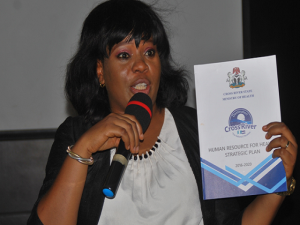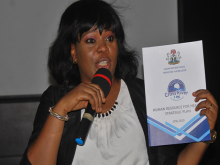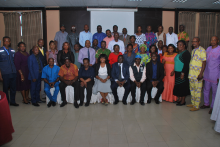Human Resource-for-Health Project producing skilled work force in Cross River State
Calabar, 05 July 2017 - Over the past three years, World Health Organization (WHO), with support from the Global Affairs Canada (GAC) human resources for health (HRH) project, has supported Cross River State in developing mechanisms for policy-driven interventions to improve HRH landscape. WHO had through the project, also supported the state’s Ministry of Health (MOH) to develop an evidence-based, gender-mainstreamed HRH Policy, HRH Strategic plan and Task shifting/sharing policy.
Only recently, a 3-day workshop (28 - 30 June 2017) was conducted in Calabar the state capital and had in attendance, government functionaries including the Commissioner for Health, Director General of the State Primary Healthcare Development Agency (SPHCDA), Permanent Secretaries, Directors, officials from relevant government agencies, private sector players and development partners. The activity was in response to request by the government to scale-up the project by building capacity of the state officials to implement the HRH strategic plan.
Dr Teniin Gakuruh who led WHO team to the workshop, highlighted the numerous support provided so far to the state, especially to the three Schools of Nursing and Midwifery that resulted in regaining accreditation after more than 3 years. WHO had also supported Cross River to set up of HRH units in the MOH, SPHCDA to facilitate implementation of the HRH Strategic plan and other HRH functions. She reiterated the commitment of WHO to further support the state to attain its ultimate HRH goal.
In response to the growing need of widely disseminated HRH policies and HRH strategic plan for implementation, WHO facilitated the provision of 1500 copies of the HRH Policy, Strategic plan and Task shifting/sharing policy as part of policy-driven health sector reforms in Cross River state. The HRH Strategic plan gives policy-driven interventions to achieve the government’s aim of ensuring that adequate number of skilled and well-motivated health workforce are available and equitably distributed to provide quality health services
Declaring the workshop open, the Cross River Commissioner for Health, Dr Inyang Asibong emphasized the positive outcomes arising from the collaboration with WHO and promised, “The MOH will continue to provide leadership for implementation of the HRH Strategic plan”. She thereafter presented a printed copy of the state HRH Strategic plan, which will be formally launched in August 2017 by the Governor of the state and the Minister of Health.
WHO has been able to achieve the HRH project’s objective of improving skills of managers of the health workforce in the state to formulate, implement and manage evidence-based and gender-sensitive human resources for health policies and plans. As well as formulation and implementation of the HRH Strategic plan.
The HRH situation analysis preceding the launch of the project showed that lack of implementation of HRH policies and plans is one of the reasons for poor HRH management in the state. However, a preliminary review of the of the implementation of the plan from 2016 to early 2017 showed that progress has been made in HRH production and management, while prioritized activities for 2017-2018 implementation cycle is building on progress made so far.
___________________________________________________
For more information, please contact:
Dr Teniin Gakuruh; Tel: +234 803 979 5149; Email: gakuruht [at] who.int
Below :
01 Cross River Commissioner for Health, presenting the HRH Strategic plan to the participants
02 Group picture of participants with Commissioner for Health (sitting in the middle) and WHO Officials (Photo Olumuyiwa WHO)


